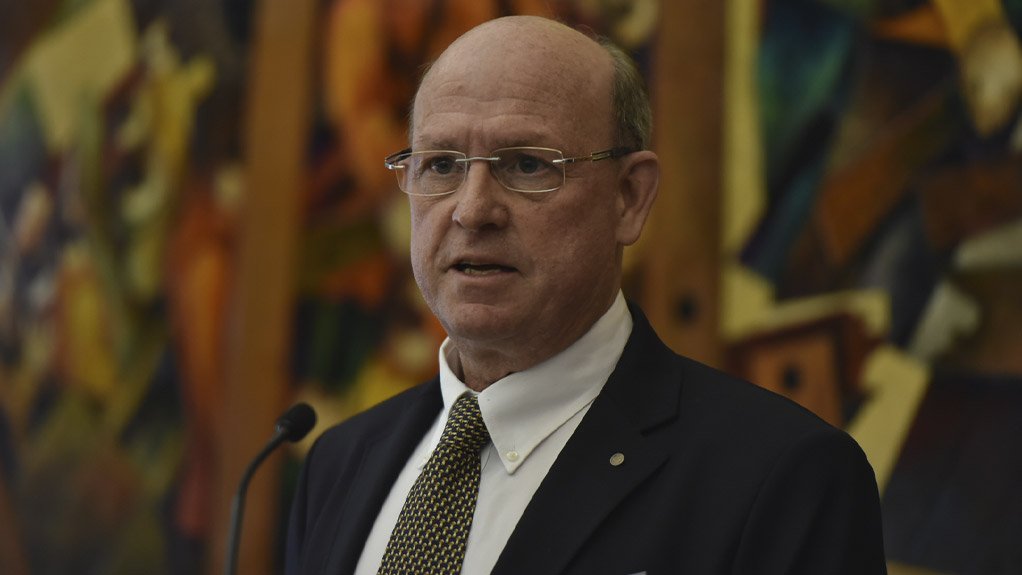University of Pretoria’s Prof Michael Wingfield wins prestigious Harry Oppenheimer Fellowship Award
This article has been supplied as a media statement and is not written by Creamer Media. It may be available only for a limited time on this website.
Mike Wingfield, a professor at the University of Pretoria’s (UP) Forestry and Agricultural Biotechnology Institute (FABI), is the recipient of the annual Harry Oppenheimer Fellowship Award.
His winning project is titled: Quest to unravel the origin and ecology of two human pathogenic fungi and expand the base of medical mycology in South Africa. Now in its 21st edition, the award was initiated by the Oppenheimer Memorial Trust in 2000 to commemorate the Trust’s founder, Harry Oppenheimer, and especially his efforts to support human and intellectual development as well as to advance scholarship. The R2 million award is ranked as one of Africa’s most prestigious research grants.
The winning project is focused on fungi that cause diseases in humans in South Africa and elsewhere in the world. “One occurs in mines and infects the skin and lymphatic tissues. The other causes a serious pulmonary disease. We know very little about them – other than from a medical perspective,” said Prof Wingfield. In this project, he hopes to discover more about where they live naturally, and to better understand them, and to avoid the diseases that they cause.
The one fungus that Prof Wingfield will track is sometimes known for its relationship to roses and handlers getting pricked by the thorns. “But the question is whether this is then a fungus on rose thorns – in rose thorns – or is it found somewhere else such as the soil and using injuries such as those caused by rose thorns to enter our bodies,” he explains. With regard to mines, it is important to know whether the fungus is in the wood or whether injuries from wooden splinters provide entry points for the fungus, which is found naturally in the environment.
The project is expected to have a far-reaching impact on humanity. Prof Wingfield said, “We need to know a lot more about the world around us in terms of microbes – where they are in the natural environment and what threats they pose to us. Take a plant disease example – most diseases of plants are caused by fungi. They seriously threaten food security. They pop up like SARS COV-2 unexpectedly and many times from unknown sources. This, we need to know more about – where are they? What are the long-term threats? Knowing such things prepares us for a more secure future.”
The project will also enhance collaboration between plant pathologists and the health sciences. South Africa is well known for its strength in mycological research (the study of fungi). “This is mostly because we have a powerful plant pathology community and that most plant diseases are caused by fungi. There is a much smaller community of scientists that consider fungi from the medical perspective and most work at the clinical level. We thus have a good opportunity to get to know each other better and to build research bridges and opportunities. I hope to at least explore those opportunities and to get this process started,” Prof Wingfield added.
The award, a flagship award by the Oppenheimer Memorial Trust, recognises scholarship of the highest calibre across various academic and research disciplines. The Trust, which dates back to 1958, has grown to become a significant funder of education, arts and culture and civil society organisations. Over the past five years, disbursements made have ranged from R100 million to R130 million annually, with roughly 60% allocated to higher education. This is part of a sustained effort to build the local academy.
Prof Wingfield has been involved in research projects in many parts of the world, particularly those relating to the health of trees and determining the pathways of movement of the organisms that cause tree disease. Among his accolades, are the Kwame Kwame Nkrumah Award, of the African Union; the Herschel Medal, of the Royal Society of South Africa and the Lifetime Achievement Award from the National Science and Technology Forum.
He has received honorary doctorates from, among others, North Carolina State University and the University of British Colombia. He is also one of a select number of academics in South Africa included in the Clarivate list of the world’s most highly cited scientists. Prof Wingfield works closely with his wife, Prof Brenda Wingfield, a previous recipient of the Harry Oppenheimer Fellowship Award. The pair is the first family members to be recognised. This is an additional cause for celebration for the 21st edition of this award.
In his acceptance speech, he said, “This award has come to me in the latter part of my career. Maybe that is mostly the case for awards of this type that have huge prestige and likely would not go to early career scientists. I see my role as one primarily of mentorship. To pass on my knowledge and experience to younger scientists – to share my passion for the fungi and for research with others that might build on what I have been privileged to do – not only via this award – but linked to my career as a scientist.”
On presentation of the award, Chair of the Trust, Jonathan Oppenheimer, stated: “Prof Wingfield’s project is a game changer. Although some excellent work on the ecology of fungi such as Sporothrix has been conducted by members of the Southern African Society for Plant Pathology, very little connection has been made to those researchers working on the clinical relevance of these fungi. An important part of this project will be to fortify the field of medical mycology in South Africa and the Oppenheimer Memorial Trust will give him the necessary support in line with its vision.”
An elated Professor Tawana Kupe, Vice-Chancellor and Principal of UP, said that he was thrilled that an academic from the University of Pretoria has received this award. “This showcases the strong focus that UP places on research excellence and postgraduate education. We are a future-focused university that is strong on transdisciplinary research. Conducting research that makes an impact underpins the University’s strategy.”
Prof Kupe added, “As one of UP’s exceptional researchers, Prof Wingfield is well placed to use this prestigious award to promote research excellence and to mentor young scientists internationally. This will contribute to the next generation of scientists, as well as boost knowledge production.”
Comments
Press Office
Announcements
What's On
Subscribe to improve your user experience...
Option 1 (equivalent of R125 a month):
Receive a weekly copy of Creamer Media's Engineering News & Mining Weekly magazine
(print copy for those in South Africa and e-magazine for those outside of South Africa)
Receive daily email newsletters
Access to full search results
Access archive of magazine back copies
Access to Projects in Progress
Access to ONE Research Report of your choice in PDF format
Option 2 (equivalent of R375 a month):
All benefits from Option 1
PLUS
Access to Creamer Media's Research Channel Africa for ALL Research Reports, in PDF format, on various industrial and mining sectors
including Electricity; Water; Energy Transition; Hydrogen; Roads, Rail and Ports; Coal; Gold; Platinum; Battery Metals; etc.
Already a subscriber?
Forgotten your password?
Receive weekly copy of Creamer Media's Engineering News & Mining Weekly magazine (print copy for those in South Africa and e-magazine for those outside of South Africa)
➕
Recieve daily email newsletters
➕
Access to full search results
➕
Access archive of magazine back copies
➕
Access to Projects in Progress
➕
Access to ONE Research Report of your choice in PDF format
RESEARCH CHANNEL AFRICA
R4500 (equivalent of R375 a month)
SUBSCRIBEAll benefits from Option 1
➕
Access to Creamer Media's Research Channel Africa for ALL Research Reports on various industrial and mining sectors, in PDF format, including on:
Electricity
➕
Water
➕
Energy Transition
➕
Hydrogen
➕
Roads, Rail and Ports
➕
Coal
➕
Gold
➕
Platinum
➕
Battery Metals
➕
etc.
Receive all benefits from Option 1 or Option 2 delivered to numerous people at your company
➕
Multiple User names and Passwords for simultaneous log-ins
➕
Intranet integration access to all in your organisation





















